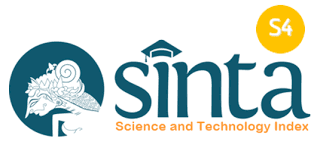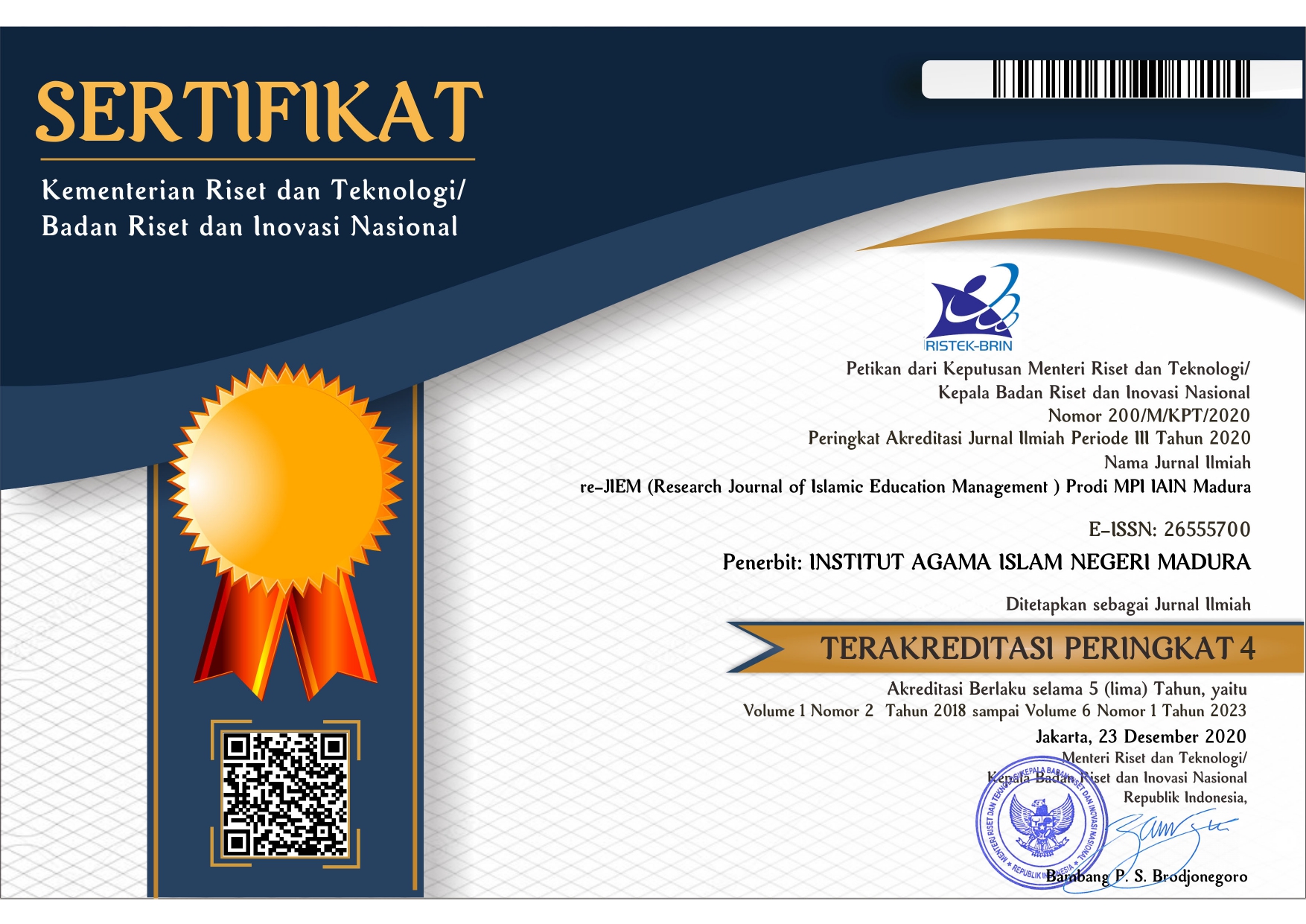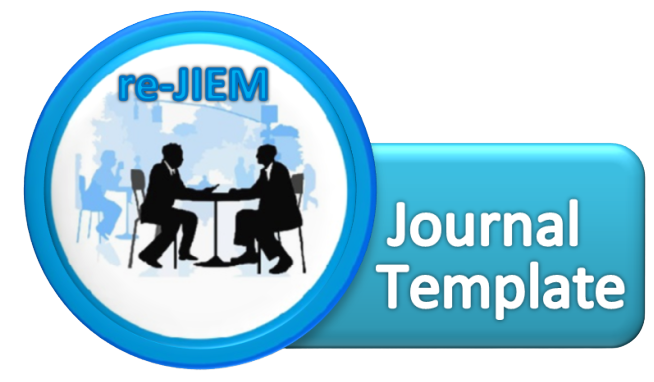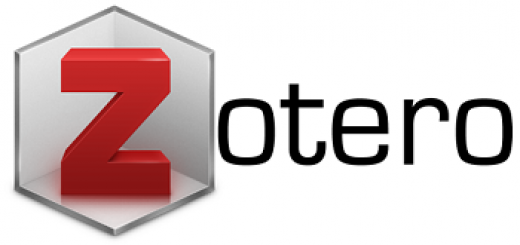IMPLEMENTASI PROGRAM KEGIATAN ORGANISASI KEMAHASISWAAN DALAM MENUMBUHKAN PERILAKU KEPEMIMPINAN MAHASISWA DI IAIN MADURA
 Abstract views: 367
,
Abstract views: 367
,
 PDF downloads: 333
PDF downloads: 333
Abstract
Student organizations are forms and means of channeling ideas, creations and works that can support students. The results of the study show that: First; Each ORMAWA organizes RAKER, which will be programmed in its leadership period from short to long term, then the results of the mutually agreed upon RAKER are submitted in RAKERGAB, SENAT students hold RAKERGAB which is attended by all ORMAWA. The work plan program in the program does not deviate from the Bylaws, then the agreed upon results are carried out according to RAKERGAB. Supporting factors include: the existence of good service from the leadership to students to carry out their activities programs in improving student leadership behavior, the leadership provides opportunities for students to create and creativity as always willing and always accompany and provide direction and motivation to students. The inhibiting factors include: Limited land and facilities that are still inadequate, lack of places to carry out limited activities, and limited provision of stationery.
Downloads
References
Atmosudirdjo, Prajud Dasar-dasar ilmu Administrasi, Jilid I. 1979.
Daryanto, Drs. H. M. Administrasi Pendidikan, Jakarta, Rineka Cipta. 1998.
Daswati. Implementasi Peran Kepemimpinan Dengan Gaya Kepemimpinan Menuju Kesuksesan Organisasi. Jurnal academica Fisip untad.
Hariri, Ridwan El. Pengaruh Perilaku Kepemimpinan Terhadap Kinerja Layanan Akademik Pegawai Di Universitas Pendidikan Indonesia. MANAJERIAL. 2011.
Hendyat Soetopo, Perilaku Organisasi, Bandung : PT Remaja Rosdakarya, 2010.
Muhaimin M.A, Dr.Suti’ah M.Pd, Dr. Sugeng Listyo Prabowo M.Pd, Manajemen Pendidikan, Jakarta : Kencana Prenada Media GROUP, 2012.
Manab, Dr. H. Abdul M. Ag. 2018. Implementasi Kurikulum Pendidikan Karakter Pendekatan Konfluensi. Tulung Agung: Kalimedia.
Mulyana, Dr. Rohmad. Mengartikulasikan Pendidikan Nilai, Bandung, Alfabeta. 2004.
http://www.artikata.com/arti-330976-intrakurikuler.html. Diakses pada tanggal 30 Agustus, pukul 20.00.
Penyusun Kamus Pusat Pembinaan dan Pengembangan Bahasa. Kamus Besar Bahasa Indonesia. Jakarta: Balai Pustaka, 1989.
Sanusi, Aris Riswandi. Peranan Organisasi Kemahasiswaan Ekstrauniversiter Sebagai Sarana pendidikan Politik Mahasiswa Dalam Menumbuhkan Dan Meningkatkan Partisipasi Politik Warga Negara Indonesia,Civics ISSN.
Silverman , David Hariri. The Theory of Organisations. New York: Basic Books, 1971.
Suroto. Dinamika Kegiatan Organisasi Kemahasiswaan Berbasis Kearifan Lokal Dalam Upaya Memperkuat Karakter Unggul Generasi Muda, 2016.
Syarief, A. Hamid. Pengenalan Kurikulum Sekolah dan Madrasah. Citra Umbara Bandung,1995.
Terry, George R. dan Leslie W. Rue. Dasar-Dasar Manjemen, (Jakarta : Bumi Aksara, 1992.
Triyanto, Eko. Sri anitah dan Nunuk Suryani. Perilaku Kepemimpinan Kepala Sekolah Dalam Pemanfaatan Media Pembelajaran Sebagai Upaya Peningkatan Kualitas Proses Pembelajaran. Jurnal Teknologi Pendidikan.
Weber,Max 1978. Economy and Society. Vol. 2. Guenther Roth Claus Wittic, eds, Berkeley,Calif : University of California Press.
Winardi S.E, Prof. Dr. J. Manajemen Perilaku Organisasi. Bandung: Kencana Prenada Media, 2004.
Zuhairini, Drs. H. dkk. Metodologi Pendidikan Agama I. Solo: Ramadhani,1993.
Copyright (c) 2021 Zaifur Rofiq

This work is licensed under a Creative Commons Attribution-ShareAlike 4.0 International License.
Authors who publish with this journal agree to the following terms:
Authors retain copyright and grant the journal right of first publication with the work simultaneously licensed under a Creative Commons Attribution-ShareAlike 4.0 International License that allows others to copy and redistribute the material in any medium or format with an acknowledgment of the work's authorship and initial publication in this journal and also allows to remix, transform, and build upon the material for any purpose, even commercially with contributions under the same license as the original.
Authors are able to enter into separate, additional contractual arrangements for the non-exclusive distribution of the journal's published version of the work (e.g., post it to an institutional repository or publish it in a book), with an acknowledgment of its initial publication in this journal.
Authors are permitted and encouraged to post their work online (e.g., in institutional repositories or on their website) prior to and during the submission process, as it can lead to productive exchanges, as well as earlier and greater citation of published work.



























